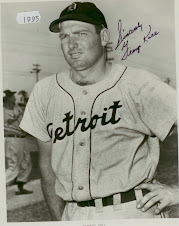Is Selig the most overpaid man in sports?
By Jeff Passan, Yahoo! Sports
Well, there had to be an explanation. The economy isn’t quite at event horizon, and big-league baseball teams continue to treat the remaining free agents as if they’re covered in salmonella-infested peanut butter. The unemployment of so many just didn’t make sense. Until now.
All that missing money went into Bud Selig’s pockets, of course! It had to, because when anything in baseball goes wrong the blame cascades toward Selig. And how else are people to feel when CEO compensation is such a hot-button issue, and the SportsBusiness Journal pores over Major League Baseball’s tax filings to reveal that Selig earned just shy of $18 million in 2007?
That’s a lot of ’68 Ramblers sold.
Oh, it’s easy to pile on. Joking about Selig peddling used cars – once and for all, he never did – is fun because it’s so easy to picture him standing on a lot, wearing a ratty tweed jacket and his patented look. You know, the one where his jaw slackens and his eyes flit, or the one where he wants to show his authority by waving a rule book that directly contradicts everything he’s saying.
Public approval never has been Selig’s forte, though it hasn’t been his motive, either. Selig has served as baseball’s commissioner for more than 16 years because the sport has enjoyed incredible financial growth, and his pay structure, one source with knowledge of it said, reflects that.
A “significant” portion of Selig’s $17.47 million salary came from performance bonuses related to MLB’s financial success, the source said. Almost assuredly, because of the recession’s effect on the sport, Selig’s pay in 2008 and going forward will be less, according to the source.
Under Selig’s watch, baseball has set attendance records, expanded the game’s international reach and grown four-fold as a business. He introduced the wild card, interleague play, the World Baseball Classic and MLB Network. Labor peace has prevailed for the longest time in the sport’s history. The owners love him. The players don’t seem to mind him. The product is great. Good executives get results, and they get paid accordingly.
Whether Selig’s successes match his failures – the explosion of steroid use, consequent hearings before Congress, a lost World Series, an All-Star Game tie and the approval of putting Spider-Man logos on bases (after which he came to his senses and quashed) – will serve as great debate fodder long after his expected retirement when his contract expires in 2012.
Still, Selig taking in more money than every player but Jason Giambi, Derek Jeter and Alex Rodriguez – and 64 percent more than the next-highest commissioner, the NFL’s Roger Goodell – is significant on many levels, chief among them how bad it looks.
What is Selig saying when MLB toward the end of 2008 instituted hiring and wage freezes? How does he explain the flat budgets throughout baseball, which affect not only how the league operates, but its ability to keep afloat such programs as Reviving Baseball in Inner Cities?
It’s worth pointing out that MLB is a private company. It may compensate its executives as it sees fit. There has been no taxpayer bailout. Selig could make $100 million with no ramifications aside from public guffawing.
On the other hand, baseball is viewed as a public trust, something to be handled with the best interest of the fan in mind. It was a blessing after the ’94 strike and after the steroid revelations, because people came back with such complicity. It’s a burden now, when dollars need to stretch like rubber bands and the many-times-a-millionaire-over commissioner is making so much, fans would have paid a quarter less per ticket in 2007 had he subsidized them with his salary.
When the stock market crashed in the beginning of October, Selig warned MLB’s owners not to “get too cocky.” Six weeks later, he brought in Paul Volcker to straddle his line between realism and Chicken Little in a chat with the owners. And now every one of them not named Steinbrenner is socking away cash like the apocalypse is near. As much as Selig seems to preach fiscal responsibility, it registers as the convenient sort, and not just because his own compensation is so significant.
At least a dozen teams are raising ticket prices this year, including the New York Mets. They will charge up to 79 percent more to watch a game on the new Citi Field, whose title sponsor is a bank rescued by … the very people paying that 79 percent premium.
The more things change … well, you know. Baseball has operated the same way for so long, it resembles that ’68 Rambler. Good old reliable, moving at a nice pace, slow and steady, slow and steady, and it keeps going up the hill, and it reaches the top, and then, when you’re least expecting it, boom! It backfires.
Jeff Passan is a national baseball writer for Yahoo! Sports. Send Jeff a question or comment for potential use in a future column or webcast.
http://sports.yahoo.com/mlb/news?slug=jp-seligsalary020309&prov=yhoo&type=lgns
Subscribe to:
Post Comments (Atom)























No comments:
Post a Comment